Musical (2023)
Music and Lyrics by Joy Huerta and Benjamin Velez
Book by Lisa Loomer
Based on the play by Josefina Lopez and
HBO’s Real Women Have Curves, Screenplay by Josefina Lopez and George Lavoo
Directed and Choreographed by Sergio Trujillo
American Repertory Theater
Loeb Drama Center, Harvard University
Harvard Square, Cambridge, MA
December 6, 2023 – January 21, 2024
Music Supervisor: Nadia Digiallonardo; Orchestrations: Bill Sherman, Cian McCarthy; Music Director: Roberto Sinha; Scenic Design: Arnulfo Maldonado; Costume Design: Wiberth Gonzalez, Paloma Young; Video Design: Hana S. Kim; Lighting Design: Natasha Katz; Sound Design: Walter Trarbach; Hair, Wig and Make-Up Design: Krystal Balleza
With Lucy Godínez (Ana), Justina Machado (Carmen), Satya Chávez (Izel), Mason Reeves (Henry), Yvette Gonzalez-Nacer (Mrs. Wright), Florencia Cuenca (Estela), Shelby Acosta (Prima Flaca), Carla Jimenez (Pancha), Eward Padilla (Raul), Jennifer Sanchez (Rosali), Sandra Valls (Prima Fulvia); Ensemble: Shadia Fairuz, Elisa Galindez, Michael Keyloun, Christopher M. Ramirez; Arusi Santi
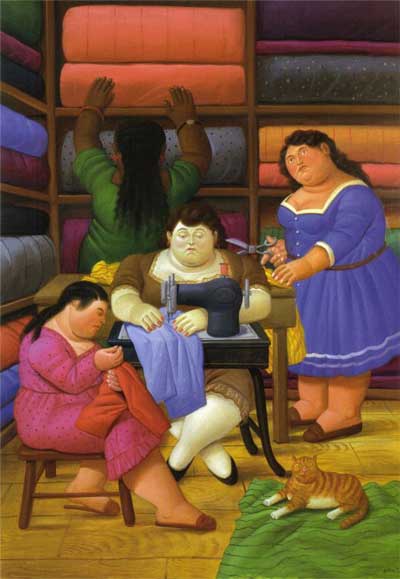
“The Designers”
In 1987 in Los Angeles, Estela (Florencia Guenca) runs a dressmaking business and employs a group of five or six women who, already working hard, have to buckle under when Estela gets a call from Mrs. Wright (Yvette Gonzalez-Nacer), a buyer who wants Estela to provide several hundred dresses in a short period of weeks. Estela takes on the challenge, and, in order to get a leg up, ropes her younger sister, Ana (Lucy Godínez) and her mother, Carmen (Justina Machado) into the act. Ana, however, has other ambitions and has been enlisted as an intern at a local newspaper and has been admitted for the following term as an undergraduate at Columbia University. Ana is afraid to confront her parents whom she fears will oppose her plan to enter Columbia and somewhat reluctantly agrees to pitch in at the dress business while mustering her courage. Meanwhile, at the internship, Ana meets another young intern, Henry (Mason Reeves), with whom an interesting relationship begins to develop. It turns out that Mrs. Wright has a more complicated history than one would have expected for a clothing executive with an Anglo name, and poses a distinct alternative to the sort of personal path that Estela, Ana, and the women at Estela’s dress business begin to envision for themselves.
This delightful, lively and entertaining musical is full of fun, high spirit and a feeling of inclusiveness and acceptance. The title of the show kind of gives its shtick away: the women who work in Estela’s shop, including Estela and her sister Ana, are real women with real women’s bodies, happy to live their lives as they are and supportive of one another in doing so. The most exuberant musical number in the show, Curves, celebrates this realization and mutual support in a wonderfully vivid and revealing way.
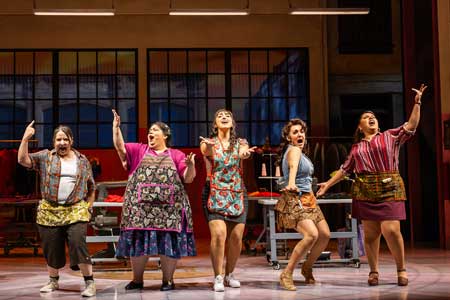
Shelby Acosta as Prima Flaca, Jennifer Sánchez as Rosalí
Florencia Cuenca as Estela
in “Real Women Have Curves: The Musical”
Photo: Nile Hawver/Maggie Hall Cast
Courtesy of American Repertory Theater
Young Ana is a powerhouse and whatever her insecurity regarding confronting her parents is about does not impede her from acting forcefully and effectively on Estela’s behalf with Mrs. Wright or with Estela’s landlord who comes to collect the rent. She is articulate and powerful and the sense of her own confidence in these confrontations empowers all of the women on the dressmaking team. As well, Ana goes to bat for Izel (Satya Chávez), a woman from Central America newly hired in the shop who has immigration issues. Ana, as one of the only American-born women on the scene, takes on the role with impunity, but when confronted with the realities of dealing with the immigration service, she, too, faces forces larger than herself.
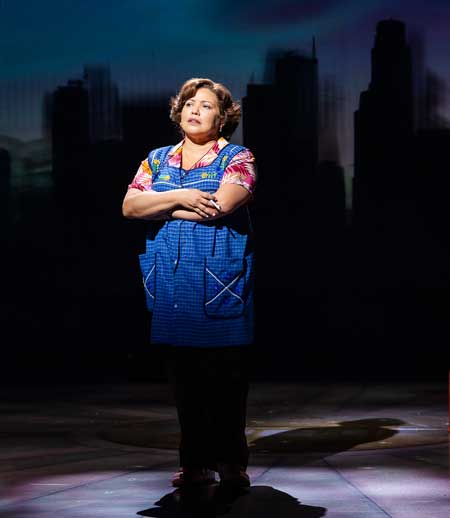
in “Real Women Have Curves”
Photo: Nile Hawver/Maggie Hall
Courtesy of American Repertory Theater
There are a lot of hilarious one-liners in this show. When Carmen, Ana’s mother, gets into a difficult discussion with Ana about Ana’s future she says We don’t need children to make us feel ashamed. We got gringos to do that! Or, when thinking about Ana’s going to Columbia University, Carmen asks: New York – is that where they put you on drugs? And perhaps the funniest line in the show is also Carmen’s, in response to Ana’s resistance to sticking around to help with the dress business: What if I have bigger dreams? asks Ana; Carmen responds Sleep less!
The choreography in this show, overseen by stage director Sergio Trujillo, is truly wonderful. The dance scenes are not hugely long nor dominant, but there are many of them and they are all done exquisitely well and in such a way that they enhance the drama effectively. It is one of the distinctively excellent features of this production.
Though the music for the show is composed by Joy Huerta, who is Mexican, and Benjamin Velez, who is Colombian-American, the music, generally seems, to these ears, less influenced by traditional Latin motifs than one might have expected. Mariachi players come out at various intervals, and there are, indeed, musical moments that have more conventional Latin flavor, but that thematic influence is not pervasive, having more the overall quality of standard Broadway musical fare. It’s bouncy, it’s catchy in its own way, but it is not notably inclined to integrate those kinds of elements that this reviewer thinks of as Latin. Certainly energetic, the music under Roberto Sinha’s direction is well-played and clearly supports the gusto of the overall production.
Despite to these ears this seeming shortage of traditional Latin influence in the music, there is a fair amount of Spanish language used in the show which does contribute to its flavor.
The lyrics, also by Huerta and Velez, are from time to time striking and inventive, but quite a bit of it tends to the more routine and repetitive. However, the songs do, each in its own way, capture significant and important themes from the drama and one does get swept up in that. Make It Work, the opening number, attests to the industriousness and ambition of Estela and her team, and it reprises effectively. Blood Thicker Than Mole is Carmen’s song, enumerating a series of funny lines about her employment, and attests that indeed our blood is thick, like the rich, spicy, chocolate-based sauce, mole. Ana sings a lovely energetic ballad called Flying Away, a theme which is emblematic of her own ambition, but carries into the other part of the narrative involving Izel. Jugglin’ is all about sewing, but then segues into a quick encounter with a 101 year old woman who attests that the secret to her longevity is to have sex everyday. Perhaps the most poignant theme vis a vis undocumented immigrants is in Always On The Run. And Curves is a wild and exuberant number that in a burst of energy brings forth the magic at the core of the show.
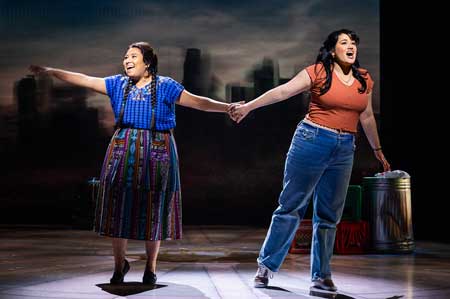
in “Real Women Have Curves: The Musical”
Photo: Nile Hawver/Maggie Hall Cast
Courtesy of American Repertory Theater
There is a lot of wonderful singing here. Notable are Lucy Godínez’s Ana, Satya Chávez’s Izel and Justina Machado’s Carmen, all with rich and powerful voices, but there is good singing all around. And the acting, exhibited especially in the roles of these leads, is very good, but, again, the ensemble does a good and convincing job throughout.
The scenic design by Arnulfo Maldonato is colorful, inventive and persuasive, with gorgeous murals overseen by video designer Hana S. Kim that adorn the background and periphery of the set. Lighting by Natasha Katz does its job well.
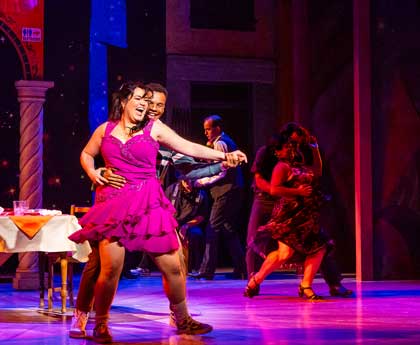
in “Real Women Have Curves: The Musical”
Photo: Nile Hawver/Maggie Hall
Courtesy of American Repertory Theater
All in all this is a very fun show with a wonderfully liberating message, and provides an important window into the lives of undocumented but hard-working people in America. Though the music might be a bit more Latin-influenced and the lyrics a bit denser, they do the job well enough. With truly excellent choreography, it all works to make for a lively and compelling show. It’s not short: two hours and forty minutes with a twenty minute intermission, but it moves along.
– BADMan (aka Charles Munitz)
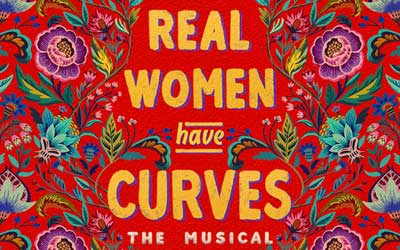
Leave a Reply